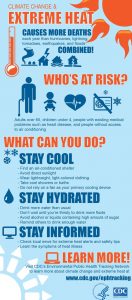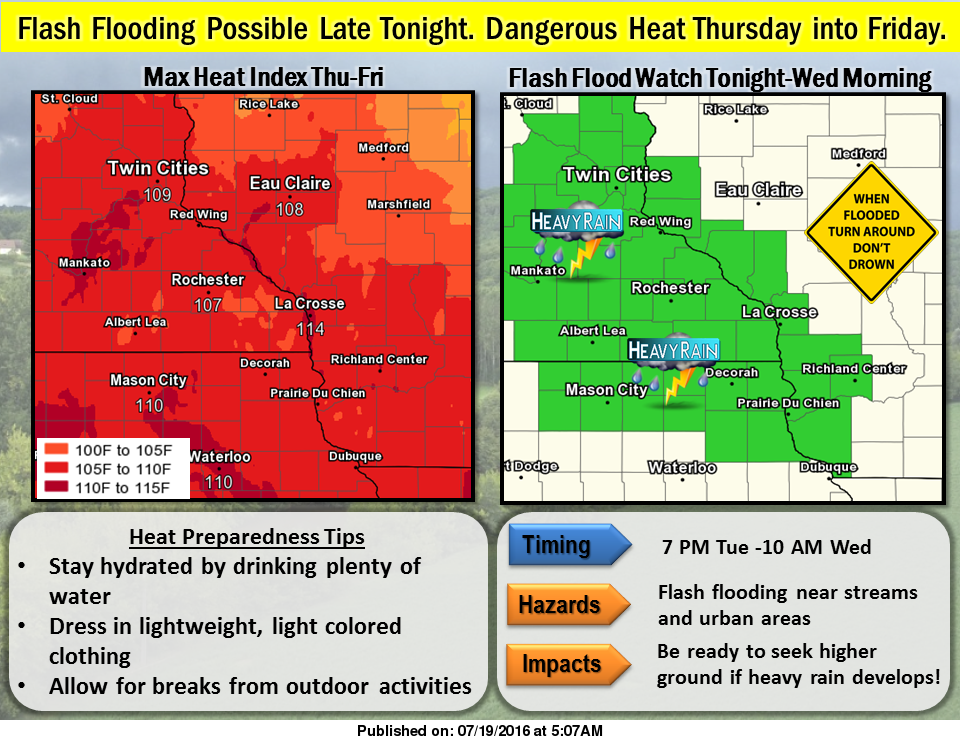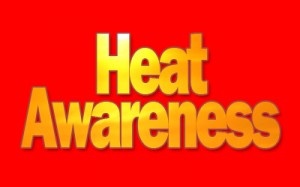GET COOL OR GET HELP NOW IF YOU FEEL:
Dizziness | Headache | Muscle Cramps | Weakness | Nausea or Vomiting
Call 9-1-1 FOR THESE SYMPTOMS:
Hot, dry skin | Confusion | Unconsciousness | Chest Pains | Shortness of Breath
 Warm temperatures combined with high humidity levels can pose a risk of heat-related illness and death. Extreme heat is described as temperatures that hover 10 degrees or more above the average high temperature for the region and last for several weeks. Humid or muggy conditions, which add to the discomfort of high temperatures, occur when a “dome” of high atmospheric pressure traps hazy, damp air near the ground.
Warm temperatures combined with high humidity levels can pose a risk of heat-related illness and death. Extreme heat is described as temperatures that hover 10 degrees or more above the average high temperature for the region and last for several weeks. Humid or muggy conditions, which add to the discomfort of high temperatures, occur when a “dome” of high atmospheric pressure traps hazy, damp air near the ground.
- Although anyone at any time can suffer from heat-related illness, some people are at greater risk than others.
- Infants and children up to four years of age are sensitive to the effects of high temperatures and rely on others to regulate their environments and provide adequate liquids.
- People 65 years of age or older may not compensate for heat stress efficiently and are less likely to sense and respond to change in temperature.
- People who are overweight may be prone to heat sickness because of their tendency to retain more body heat.
- People who overexert during work or exercise may become dehydrated and susceptible to heat sickness.
- People who are physically ill, especially with heart disease or high blood pressure, or who take certain medications, such as for depression, insomnia, or poor circulation, may be affected by extreme heat.
In Wisconsin, generally when temperatures approach or go above 90° F, the following actions are recommended:
- Avoid strenuous activity during the hottest part of the day. If such activity is unavoidable, drink plenty of fluids and take frequent breaks in air-conditioned or shaded areas. Consider monitoring body weight and oral temperature. A weight loss of more than 2 lbs. or an oral temperature above 99° F is cause for concern.
- Do not leave anyone – children, disabled individuals, pets – in cars for even brief periods. Temperatures can rise to life-threatening levels in a matter of minutes.
- Make frequent checks on the status of elderly or ill relatives or neighbors. If necessary, move them to an air-conditioned environment during the hottest part of the day.
- To avoid dehydration, a conscious effort should be made to drink more fluids during hot weather. Rapid weight loss may be a sign of dehydration. Don’t drink liquids that contain caffeine, alcohol, or large amounts of sugar–these actually cause you to lose more body fluid.
- Use fans to increase ventilation. If the temperatures exceed 90° F, instead of having a fan blow hot air in from a window, have the fan blow the hot air to the outside. At extreme high temperatures, a fan loses its ability to effectively reduce heat-related illness.
- Cool showers, baths, and sponge baths can be used to reduce body temperatures. In addition, wet clothing has a cooling effect.

